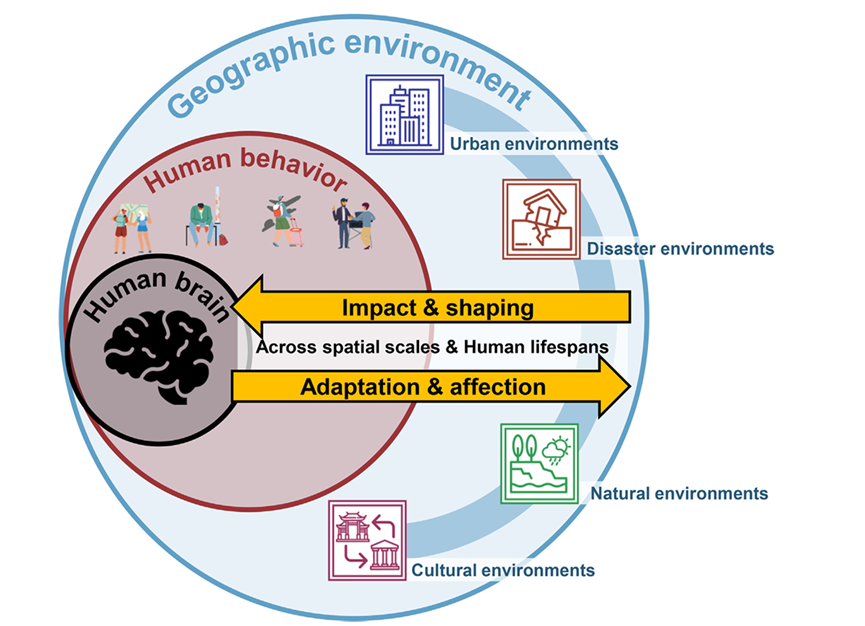On January 27, 2025, Prof. Weihua Dong's group at the Department of Geographic Sciences of Beijing Normal University published a paper in the international academic journalScience BulletinNeurocognitive geography: exploring the nexus between geographic environments, the human brain, and behavior". The article proposes a groundbreaking interdisciplinary field, Neurocognitive Geography. The article proposes a pioneering interdisciplinary field, cognitive neurogeography, which is based on the theories and methods of geography and cognitive neuroscience, and aims to break through a series of challenges faced by current research, such as data sampling, fusion analysis, scaling effects, and bi-directional feedforward, and to reveal the interaction mechanisms between complex geographic environments, the human brain, and behavior. Cognitive Neurogeography is an important tool for understanding human geography. Cognitive neurogeography provides a new perspective for understanding the relationship between human beings and the earth, and offers interdisciplinary theories and methods for promoting the goals of sustainable development.
In the current rapid development of global urbanization, climate change and cross-cultural communication, the geographical environment profoundly influences human character, cognition and behavior, and human behavior is constantly adapting and transforming the geographical environment. The interaction between complex geographic environment and human cognitive behavior is a difficult and hot issue in international interdisciplinary research. One of the difficulties is the spatial complexity of the geographic environment, where environmental factors in different regions and spatial scales continuously and systematically influence human behavior. Another difficulty is the complexity of human behavior, which is mediated by the brain and varies with age, gender and socioeconomic status.
To address the above challenges, this paper proposes the cutting-edge cross-cutting field of cognitive neurogeography, which is based on geography and cognitive neuroscience, and addresses the core topics of human-earth relations, such as urbanization, global disasters, climate change, and cross-cultural exchanges, and explores the mechanism of environment-brain-behavior interactions from both the macro geospatial perspective and the micro neurological perspective (Fig. 1). Cognitive neurogeography focuses on how urban form, structure and function shape and influence residents' brain cognition and behavioral patterns, how disasters such as extreme weather, earthquakes and infectious diseases affect human emotions and personality, how natural environments such as topography and climate affect human cognitive abilities, and how spatial heterogeneity of cultural environments such as language and ethnicity shapes the brain substrate and influences social behaviors, among other specific research questions.
The main challenges facing cognitive neurogeography are fourfold. First, there is a need to improve the joint sampling scheme of environmental and neuroimaging data under the principle of strict adherence to international data governance frameworks; second, there is a need to develop multimodal data fusion and analysis methods to address the feature inconsistency between neuroimaging and geospatial data; and third, there is a need to further explore the sensitivities of the spatial scales of geographic environments and the effects of the human life cycle on the brain and behavior. Finally, cognitive neurogeography research needs to focus on the environment-brain-behavior two-way mutual feedback process, both to reveal how geo-environmental factors influence human behavior by shaping the brain and to explore how humans perceive, adapt and change the geo-environment.



Figure 1 Mechanisms of interaction between geography, human brain and behavior
In the future, with the joint efforts of geographers, cognitive neuroscientists and scholars from other fields, this interdisciplinary field can help society develop more scientifically sound policies to advance the United Nations Sustainable Development Goals of sustainable cities, good health and well-being, reducing regional inequalities and climate action.
Prof. Weihua Dong, Institute of Frontier Cross-Institute for Satellite Applications, Department of Geographic Sciences, Beijing Normal University, is the corresponding author of the paper, and Tianyu Yang, PhD student of the class of 2021, is the first author. Co-authors of the paper include Dr. Tong Qin, Ph.D. candidate from the Department of Geography, Ghent University, Belgium; Dr. Jiaxin Zhang from the Institute of Physics, University of Chinese Academy of Sciences, China; Dr. Zheng Dong, Ph.D. candidate from the Department of Geographic Sciences, Beijing Normal University; Dr. Yulin Wu, Ph.D. candidate from the School of Urban Planning and Design, Peking University; Prof. Xiaohong Wan and Prof. Xi-nian Zuo from the State Key Laboratory of Cognitive Neuroscience and Learning, Beijing Normal University; Prof. Yu Liu from the School of Earth and Space Sciences, Peking University College, Prof. Yu Liu, Associate Prof. Song Gao, Department of Geography, University of Wisconsin-Madison, and Academician Qiao Wang, Institute of Frontier Cross-Institute for Satellite Applications, Department of Geosciences, Beijing Normal University. The study was supported byNSFCFunded by the Strategic Research Category Special Project (No. 42242102).
T. Yang, T. Qin, J. Zhang, Z. Dong, Y. Wu, X. Wan, Y. Liu, S. Gao, X-n. Zuo, Q. Wang, W. Dong, Neurocognitive geography: exploring the nexus between geographic environments, the human brain, and behavior, Science Bulletin (2025)
doi: https://doi.org/10.1016/j.scib.2025.01.044
Company Profile



























































